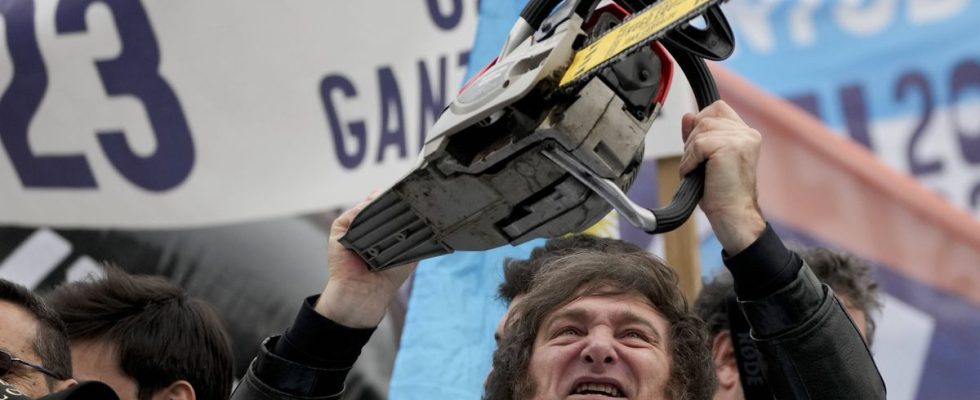Jair Bolsonaro wanted to “change the destiny of Brazil”, Javier Milei promises to tackle Argentina’s problems “with a chainsaw”. The former Argentine television polemicist, aged 53, won the presidential election this Monday. The campaign of this “anarcho-capitalist” and libertarian was paved with resounding declarations.
From the dollarization of the Argentine economy to the legalization of the sale of organs, Javier Milei has created the controversies which have punctuated the race for the head of the country in recent months. But between the verbal slip-ups and the realization of “chainsaw” projects, which he liked to brandish during political meetings to illustrate the drastic cuts to come in public spending, there is a principle of reality against which Javier Milei could well come crashing down.
“The more he scandalized, the more people talked about him”
“He used these transgressive speeches to control the political agenda, it is a campaign strategy. His statements were so extreme that they made headlines. The more he scandalized, the more people talked about him,” analyzes Maria Elisa Alonso, teacher-researcher at the University of Lorraine and specialist in Latin America. The politician who presents himself as “anti-system” promised shock therapy to Latin America’s third largest economy with massive budget cuts, going so far as to advocate the total elimination of several ministries, like the one Health or Transport.
Refusing “lukewarmness” and “half measures”, Javier Milei is in line with Donald Trump or Jair Bolsonaro. “We can clearly see the influence of Trump and Bolsonaro in his borderline personality. When he advocates the authorization of the sale of organs, he does not seduce the electorate with this promise but with his freedom of tone, because it implies that he has no alliance with the political world. , deciphers Dario Rodriguez, lecturer at Sorbonne University.
Repeated political and financial scandals have gradually eroded the confidence of the Argentine people in their elected officials. In December 2022, former president Cristina Kirchner was sentenced to six years in prison for “fraudulent administration” to the detriment of the State. By distancing himself from politicians, Javier Milei has managed to win the hearts of Argentines, sickened by years of corruption and strangled by inflation which amounts to 143% over one year.
A new president with “tied hands”
But between the seduction operation and the realization of campaign promises, the step is particularly high. Populists “generally propose political offers which mobilize on the break with reality. It’s very effective during the phase of conquest of power but it’s something else once you obtain it,” warns Christophe Ventura, research director at IRIS and author of Geopolitics of Latin America.
If Javier Milei has built an image outside the mysteries of Argentine power, it is however the support of the right which propelled him to the presidency. “The real architect of his victory was the right-wing bloc which supported him in the second round in order to prevent the Peronists from [à travers la candidature de Sergio Massa] remain in power,” assures the Latin America specialist. It remains to be seen to what extent this alliance of circumstances could last.
Because, for the moment, Javier Milei only has 38 deputies out of the 257 in the Argentine Parliament. “We must not forget that to legislate in Argentina, a quorum is required, that is to say half of the deputies plus one. He is very far from it,” observes Maria Elisa Alonso who adds that the new president will “have his hands tied” because it is “unlikely that he will succeed in constituting a majority” in Parliament. Half of the parliamentarians were renewed in the first round of the presidential election and the second half will be renewed during elections in two years.
The specter of authoritarianism
Javier Milei therefore finds himself obliged to form alliances and, therefore, probably to put water in the wine of his shocking campaign declarations. However, even if the former polemicist managed to create a majority in Parliament, he would face other obstacles. “Some of these promises are unfeasible without revising the Constitution. Privatizing education is impossible without changing the Constitution in Argentina since it is a prerogative of the provinces,” illustrates Maria Elisa Alonso. “He will face resistance at all levels! », from parliamentary negotiations to the legal-legal battle for certain measures, assures Christophe Ventura.
Like Donald Trump who hoped to build a wall between the United States and Mexico (and make Mexico pay for it) but saw his ambition quickly collapse, Javier Milei is preparing to encounter the wall of reality. “The question is rather: ‘What will he do when he realizes that it is impossible to do what he announced?’ », whispers Dario Rodriguez who adds that the new president “could try to break the barriers of a classic democracy”. “There is a lot of authoritarian drift in Latin America and Javier Milei made numerous statements implying that he could free himself from democracy during the campaign,” recalls Maria Elisa Alonso. “The forceful passage is one of the possible scenarios,” adds Christophe Ventura.
In Argentina, 40% of the population lives below the poverty line. “The Milei vote is a vote of rage and despair. The population notes the failure of the two political projects that have emerged since the economic crisis of 2001. Society can no longer take it,” observes Dario Rodriguez. The Argentines who “barely manage to survive”, according to Maria Elisa Alonso, have therefore chosen the “chainsaw” to this continuity which continues to push them into poverty. At the risk of cutting apart their democratic institutions in the process.

